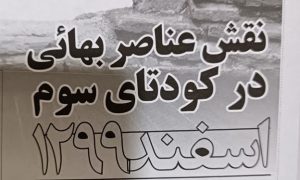The bond and cooperation between Bahaism and the Zionistic regime is of the clear realities in history. This cooperation and interaction which continued increasingly to the last moments of the regime’s lifetime possess a background even more than Pahlavi kingdom lifetime and go back to the years before 3rd of Isfand 1299 S.H. coup.
The historical documents indicate that the assembly of Bahaism in Iran discovered Reza Khan via its agent Habibullah Einul Molk (Horveyda’s father), the prime minister of Pahlavi era and introduced him to Ardeshir Reporter (or Ardeshir J), the British spy in Iran for the coup. Ecxept these people, other elements of Baha’is cooperated the people of the coup, too who succeeded to enter into Seyyed Ziauddin Tabatabaee’s cabinet. Some reports indicate that Reza Khan had promised the British to leave the agents of the deviant cult of Bahaism to be free to be active in Iran.
The following Baha’i elements played role in the coup:
Habibullah Einul Molk:
Einul Molk was one of the known Baha’i whose father Mirza Reza Ghannad Shirazi was of the disciples of Abbas Effendi the head of the Baha’is. Edward Browne writes: Muhammad Reza Shirazi is one of the confidants of Baha. He is one of nine Baha’is whom Abbas Effendi opened Baha’s will in his presence and read two days after Baha’s death.
The bond and closeness of Mirza Reza Ghannad to the head of Bahaism caused his son Einul Molk to be the secretary of Abdul Baha when he was young. Fadhel Mazandarani one of the famous proselytizers of Bahaism writes in this regard: “Agha Muhammad Reza Ghannad became one of the devoted disciples of the Excellency Abbas Effendi to the end of his lifetime. His grave is in Acre. Einul Molk was his son who was the author of the Excellency Abbas Effendi. Then, he had a governmental job and commissioned in the ministry of foreign affairs. His other son was Mirza Jalil who was a tailor in Acre and his daughter got married in Damascus.
There is a short note written by Abbas Effendi in which he asks his followers to provide a job for Einul Molk. Apparently; due to these supports and requests, Einul Molk entered into the ministry of foreign affairs and was active for a long time in Arabic countries such as Syria, Lebanon, the Saudi Arabia as consul and continued till World War II. Additionally, he was commissioned to expand and proselytize for Bahaism. He educated in an American school in Beirut in which he learned Arabic, English and French languages. Next, he went to Paris and visited warlord Asa’d Bakhtiyari, one of the a secular warlords of the Constitution. After a while, he became the teacher of Asa’d’s offspring. So, he was entitled as Einul Molk by Ahmad Shah. Then, he introduced Reza Khan to the British spy (Sir Ardeshir Reporter) for the military leadership of the coup of 3rd of Isfand. Muhammad Reza Ashtiyan Zadeh, the lawyer of the national council parliament in Pahlavi era says: “Habib Rashidian (the employee of the British embassy and the famous agent of England in Iran) narrates for me that some years before the coup 1299 S.H., I was going to Einul Molk’s house who was one of the influential people in Bahaism cult ordered by the British Colonel Freezer most of the weekdays in the morning. I became familiar with Ardashir J. One day, Ardeshir. J. said to Einul Molk: I ask you to consult with the assembly of the w Baha’is and ask them to find a tall handsome official and introduce him to you. However, there are two conditions: he mustn’t be gendarme and he must certainly be Cossack and he mustn’t surely be pure Shia. The lord Ardeshir J. particularly emphasized on the last option and said and repeated the last one. Rashidian said: After that meeting, Einul Molk made Reza Khan familiar with Ardeshir J. and Ardeshir introduced Reza Khan to Freezer and Freezer introduced him to the other British people in charge of the coup like Howard Smis and Gardener, the British consul in Boushehr.
It is worthy to be thought that during the time when Einul Molk was the prime minister, Zia was the consul of Iran in Damascus. On 6th of Farvardin 1300 S.H., (That is, 12 days after the coup), he interviewed with Lasan-al Arab (Damascus, Rajab 16, 1339 A.H.) and praised the coup and commemorated Seyyed Zia as of the great and effective means of Iran who possesses efficiency enough to revitalize the historical spirit of Iran and expand the Iranian people.
Mirza Ali Muhammad Khan Moger al-Doleh
He is a famous Baha’i who played role in the coup of 3rd of Isfand 1299 S.H. and was active in the cabinet resulting as the coup. Mirza Ali Muhammad Khan Moqerudduleh who was of the maternal relatives of Ali Muhammad Bab died after a short while after the coup 1299 S.H. Mogerudduleh was Hassan Baluzi’s father (one of the announcers of Persian BBC. London).
The other Baha’i who cooperated with those who were in charge of the coup of the Isfand the 3rd is Hassan Nikoo (the ex- proselytizer of Bahaism who turned to Islam and wrote a book against the deviant cult Bahaism.






